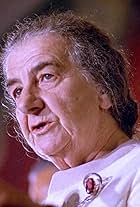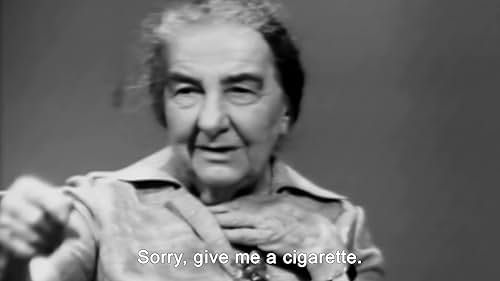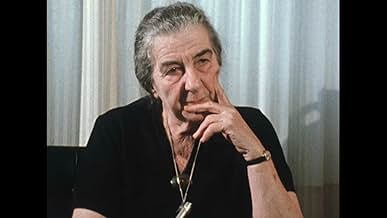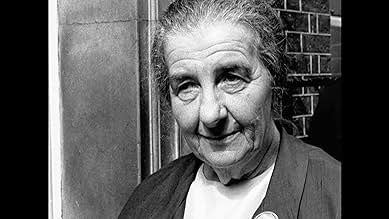Golda Meir(1898-1978)
- Soundtrack
She initially grew up in Pinsk. However, due to the anti-Jewish riots in Russia, the family emigrated to the USA in 1906, where they set up a small business in Milwaukee (Wisconsin). At the age of 14, Mabovitch ran away from home to live with her older sister in Denver. There in 1915 she came into contact with a socialist wing of the Zionist movement, which called the "Poale Zion" movement in the USA and advocated the establishment of an equal Jewish society in Palestine. In 1917 she married Morris Meyerson, whose name was Hebraized to "Meir" in 1956. In 1921 the couple emigrated to Palestine, where they joined Kibbutz Merhavia. In 1922 they moved to Jerusalem, where their first child, Menachem, was born a year later.
In 1928, Meir was appointed secretary of the Workers' Council of Histradut, the Jewish Workers' Union of Palestine. From 1932 to 1934 she worked as a representative of the women's organization in the USA. During this time she separated from her husband, who died in 1951. After her return, Meir was accepted into the Histadrut's executive committee in 1934 and made head of the political department. During the Second World War she was a member of the War Economic Advisory Board set up by the British Mandate Government for Palestine. In the last years of the British mandate after the war, Meir was the most important representative of the Jewish cause in Palestine. In 1947/48 she was actively involved in the preparations for the founding of the State of Israel. She was one of the 25 signatories of the Declaration of Independence of May 14, 1948, which is considered Israel's founding act.
As the first Israeli ambassador to the Soviet Union, Meir was sent to Moscow in 1948, where she soon began to initiate the emigration of numerous Jews to Israel and the West. In 1949, Meir returned to Israel, where she worked as a member of the Labor Party (Mapai) in the Knesset until 1974 and also in numerous government functions. As Minister of Labor from 1949 to 1955, she made outstanding progress in building a social system and creating jobs for the masses of immigrants. In the decade 1955 to 1965, Meir made a recognized name for herself at the international level as Israel's Foreign Minister. In this role, she primarily built a comprehensive development program for African states with which Israel had worked closely for a long time.
In 1965, Meir was promoted to general secretary of the Labor Party, as which she subsequently contributed to the unification of the three Labor parties to form the Israel Labor Party. On March 7, 1969, Meir was appointed Prime Minister of Israel, succeeding the late Eshkol. As head of government, the politician advocated negotiations and a peace solution with the Arab world. At the same time, however, it rejected talks with the PLO under Yasser Arafat because it viewed it as a terrorist organization. Meir was the first Jewish head of government to meet with Pope Paul VI at the beginning of 1973. together. In the fall it had to overcome a serious foreign policy crisis with the Yom Kippur War. In the general election of December 1973 the Labor Party was confirmed in government.
However, in 1974, Meir resigned from her position as head of government in connection with a parliamentary investigation into the military events during the Yom Kippur War. As a result, Meir continued to appear in public and in the press as an advocate for the Israeli cause.
Golda Meir died on December 8, 1978 in Jerusalem (Israel).
In 1928, Meir was appointed secretary of the Workers' Council of Histradut, the Jewish Workers' Union of Palestine. From 1932 to 1934 she worked as a representative of the women's organization in the USA. During this time she separated from her husband, who died in 1951. After her return, Meir was accepted into the Histadrut's executive committee in 1934 and made head of the political department. During the Second World War she was a member of the War Economic Advisory Board set up by the British Mandate Government for Palestine. In the last years of the British mandate after the war, Meir was the most important representative of the Jewish cause in Palestine. In 1947/48 she was actively involved in the preparations for the founding of the State of Israel. She was one of the 25 signatories of the Declaration of Independence of May 14, 1948, which is considered Israel's founding act.
As the first Israeli ambassador to the Soviet Union, Meir was sent to Moscow in 1948, where she soon began to initiate the emigration of numerous Jews to Israel and the West. In 1949, Meir returned to Israel, where she worked as a member of the Labor Party (Mapai) in the Knesset until 1974 and also in numerous government functions. As Minister of Labor from 1949 to 1955, she made outstanding progress in building a social system and creating jobs for the masses of immigrants. In the decade 1955 to 1965, Meir made a recognized name for herself at the international level as Israel's Foreign Minister. In this role, she primarily built a comprehensive development program for African states with which Israel had worked closely for a long time.
In 1965, Meir was promoted to general secretary of the Labor Party, as which she subsequently contributed to the unification of the three Labor parties to form the Israel Labor Party. On March 7, 1969, Meir was appointed Prime Minister of Israel, succeeding the late Eshkol. As head of government, the politician advocated negotiations and a peace solution with the Arab world. At the same time, however, it rejected talks with the PLO under Yasser Arafat because it viewed it as a terrorist organization. Meir was the first Jewish head of government to meet with Pope Paul VI at the beginning of 1973. together. In the fall it had to overcome a serious foreign policy crisis with the Yom Kippur War. In the general election of December 1973 the Labor Party was confirmed in government.
However, in 1974, Meir resigned from her position as head of government in connection with a parliamentary investigation into the military events during the Yom Kippur War. As a result, Meir continued to appear in public and in the press as an advocate for the Israeli cause.
Golda Meir died on December 8, 1978 in Jerusalem (Israel).









